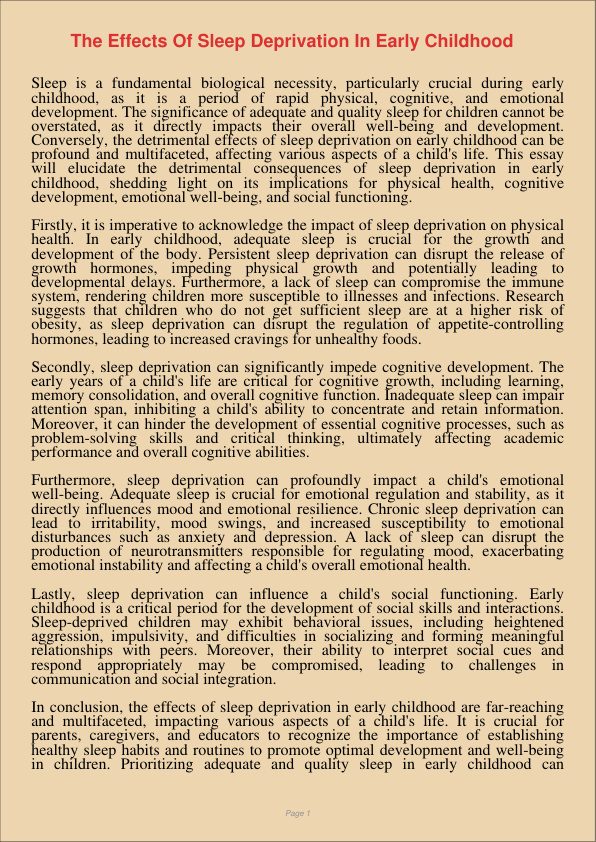Sleep is a fundamental biological necessity, particularly crucial during early childhood, as it is a period of rapid physical, cognitive, and emotional development. The significance of adequate and quality sleep for children cannot be overstated, as it directly impacts their overall well-being and development. Conversely, the detrimental effects of sleep deprivation on early childhood can be profound and multifaceted, affecting various aspects of a child’s life. This essay will elucidate the detrimental consequences of sleep deprivation in early childhood, shedding light on its implications for physical health, cognitive development, emotional well-being, and social functioning.
Firstly, it is imperative to acknowledge the impact of sleep deprivation on physical health. In early childhood, adequate sleep is crucial for the growth and development of the body. Persistent sleep deprivation can disrupt the release of growth hormones, impeding physical growth and potentially leading to developmental delays. Furthermore, a lack of sleep can compromise the immune system, rendering children more susceptible to illnesses and infections. Research suggests that children who do not get sufficient sleep are at a higher risk of obesity, as sleep deprivation can disrupt the regulation of appetite-controlling hormones, leading to increased cravings for unhealthy foods.
Secondly, sleep deprivation can significantly impede cognitive development. The early years of a child’s life are critical for cognitive growth, including learning, memory consolidation, and overall cognitive function. Inadequate sleep can impair attention span, inhibiting a child’s ability to concentrate and retain information. Moreover, it can hinder the development of essential cognitive processes, such as problem-solving skills and critical thinking, ultimately affecting academic performance and overall cognitive abilities.
Furthermore, sleep deprivation can profoundly impact a child’s emotional well-being. Adequate sleep is crucial for emotional regulation and stability, as it directly influences mood and emotional resilience. Chronic sleep deprivation can lead to irritability, mood swings, and increased susceptibility to emotional disturbances such as anxiety and depression. A lack of sleep can disrupt the production of neurotransmitters responsible for regulating mood, exacerbating emotional instability and affecting a child’s overall emotional health.
Lastly, sleep deprivation can influence a child’s social functioning. Early childhood is a critical period for the development of social skills and interactions. Sleep-deprived children may exhibit behavioral issues, including heightened aggression, impulsivity, and difficulties in socializing and forming meaningful relationships with peers. Moreover, their ability to interpret social cues and respond appropriately may be compromised, leading to challenges in communication and social integration.
In conclusion, the effects of sleep deprivation in early childhood are far-reaching and multifaceted, impacting various aspects of a child’s life. It is crucial for parents, caregivers, and educators to recognize the importance of establishing healthy sleep habits and routines to promote optimal development and well-being in children. Prioritizing adequate and quality sleep in early childhood can significantly contribute to physical health, cognitive development, emotional well-being, and social competence, laying a solid foundation for a child’s holistic growth and development.

「真诚赞赏,手留余香」
真诚赞赏,手留余香
使用微信扫描二维码完成支付
